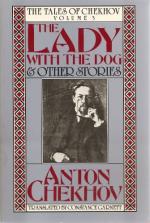|
This section contains 6,097 words (approx. 21 pages at 300 words per page) |

|
SOURCE: "Stuffed Seagulls: Parody and the Reception of Chekhov's Plays," in Poetics Today, Vol. 8, No. 2, 1987, pp. 285-98.
In the essay below, Senelick surveys works that caricature and satirize Chekhov's dramas.
Parody, the late Dwight Macdonald has declared, is "an intuitive kind of literary criticism, shorthand for what 'serious' critics must write out at length" (1969:xiii).1 At its most refined, parody speaks to the in-crowd, those who are closely acquainted with the text being parodied, and who can best appreciate the accuracy of the parodist's hits. In its perception of an author's foibles and tics, parody must be as astute and as keen as any literary analysis; often, it is informed by a clear-sighted affection for its object of concern. The best parodist, at the level of a Max Beerbohm or a Marcel Proust, has so alert an ear for the idiosyncrasies of his author that his imitation may...
|
This section contains 6,097 words (approx. 21 pages at 300 words per page) |

|


